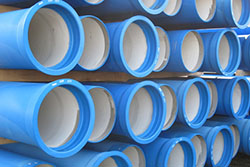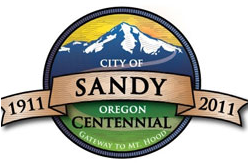
More communities now embrace “dig once” policies to facilitate installation of future and current networks. The idea is to be mindful of trenching for transportation and utility projects and encourage collaboration between agencies. However, this is implemented in a variety of ways, some more effectively than others. By establishing requirements for conduit installation in development codes, communities can save big dollars if they build or expand a network in the future.
Communities such as Sandy, Oregon, and Mount Vernon, Washington, have instituted such policies. Both communities require private developers to install conduit when disturbing existing roads or building roads for new subdivision construction. Conduit itself is inexpensive and the digging is already done, so the added burden is light.
Both of these communities have plans, including maps, that allow them to be strategic in where they require conduit to be placed. They are not simply adding conduit blindly, though that policy may be better than doing nothing at all (experts are divided on the matter).
In Sandy, the code change (see Sec. 17.84.60) was a simple expansion of existing policy. The city added “broadband (fiber)” to the list of public facilities, such as public water, sanitary sewer, and storm drainage. Underground communication lines join a list of other required improvements that are to be installed in new developments at no expense to the city. Other items on that list include drainage facilities, mailbox delivery units, street lights and a underground power lines. (see Sec. 17.100.300).
Anticipated connectivity raises the value of new homes and makes them more attractive to today’s buyers. Scott Lazenby, City Manager in Sandy, spoke to us for a recent podcast and told us how a developer in the area is excited about the potential. SandyNet plans to offer 100 Mbps Gbps residential service via the new conduit at an incredibly low $40 per month; the developer sees that as a major selling point.

In Mount Vernon, Washington, the community added conduit placement requirements in 1999 to help with the build of its open access telecommunications network. The code reads:
All developments shall be required to construct and install telecommunications conduit on all streets that are affected, disturbed, constructed and/or improved by development unless otherwise approved, pending a review by the city engineer. This conduit shall be for the purpose of installing telecommunications cable, fiber optic wiring or other infrastructure as necessary.
This conduit shall be placed at horizontal and vertical locations as determined by the city engineer. The conduit shall conform to the size, shape and characteristics as determined by the city engineer based on industry standards. Once installed and accepted by the city, the conduit shall become the property of the city of Mount Vernon.
Development as defined in this section shall mean the construction of improvements such as buildings, homes, subdivisions, streets, and utilities. (Ord. 2927, 1999).
Kim Kleppe, Information Systems Director, notes that the policy has helped immensely in locations where aerial installation was not possible. Kleppe says the city has relaxed the requirement in recent years for residential builds because community leaders are now focused on commercial and government growth for the open access network. We interviewed Kleppe in episode #38 of the Broadband Bits podcast.
Even if a community does not ultimately build its own network, the underground pathways will be in place for leasing should a private provider choose to build. Local communities need to take advantage of any tool that can facilitate possible expansion of their telecommunications utility, whether that utility exists today or is still just an idea.
